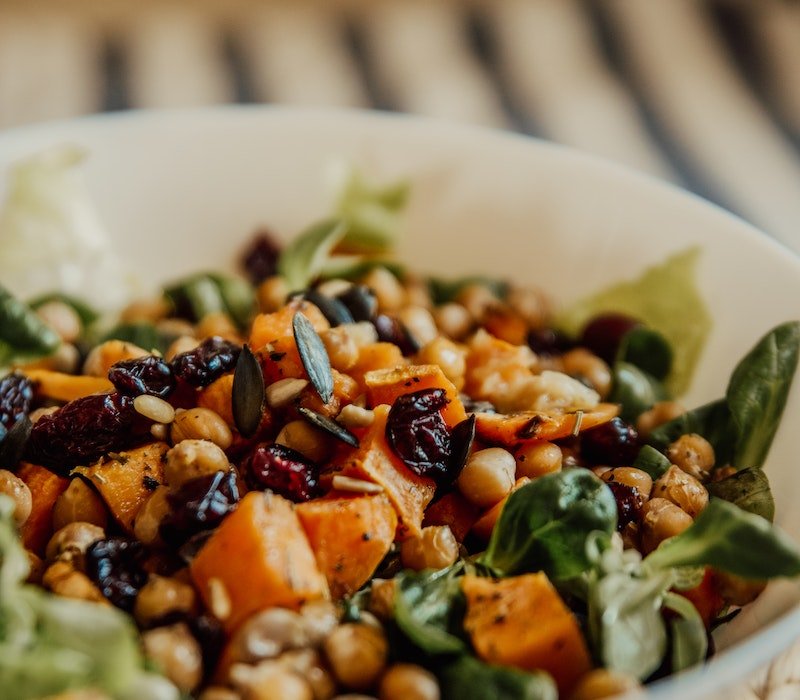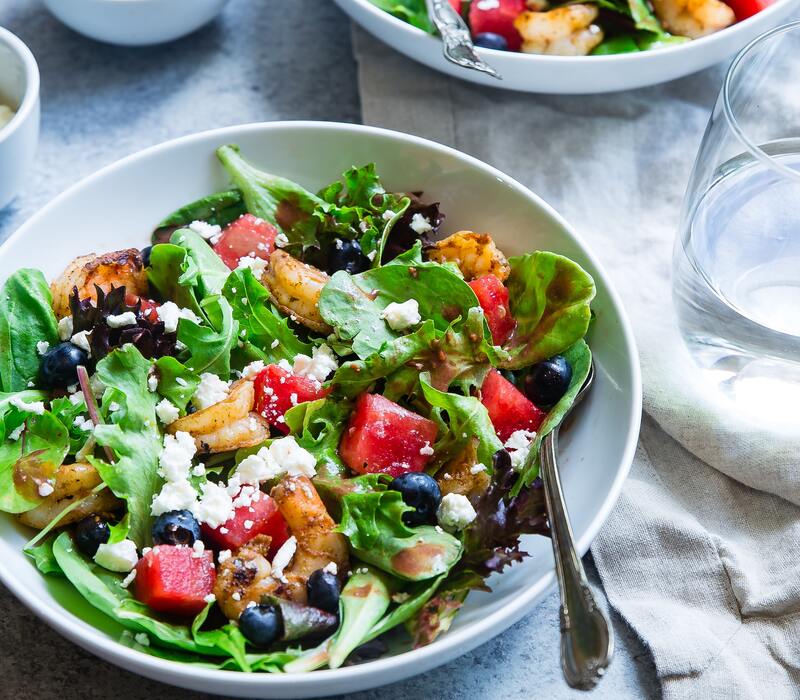Salads are very important for our health as they give you almost every nutrient. Daikon Salad is nothing less.
Before getting into the details of daikon salad we must know about daikon itself. The nutritional values and knowledge of daikon are very important to know.
Page Contents
Daikon
Daikon radish, also known as luobo, winter, white, oilseed, and icicle radish, is a type of radish native to China and Japan.
It is grown worldwide for human and livestock food and as a seed oil used in the cosmetic industry. Farmers also plant it as a cover crop to improve soil health and increase crop yields.
Daikon radish grows slower than spring radish and is considered to be winter radish. Winter radishes are sown from mid-summer to late summer and harvested in the cooler months.

Types of Daikon Used in Daikon Salad
Daikon has a crunchy texture and resembles a large carrot. Compared to other radishes, it has a mellow, slightly sweet, and slightly pungent taste.
Radishes are most commonly white with green tips like leaves, but radishes come in many different shades of red, green, purple, etc. They come in three shapes: cylindrical, rectangular, and spherical. grow.
Here are some interesting varieties of radishes:
Miyashige White
This radish is white and has a cylindrical root 41-46 cm long. It is characterized by its crunchy texture and mellow taste. KN Bravo.
KN-Bravo
It is a beautiful daikon radish with purple skin and light purple to white flesh. The roots are about 15 cm long and have a faint sweetness.
Alpine
The roots of alpine radish are short, 13-15 cm long. This variety is a popular choice for making kimchi (a fermented vegetable dish) and has a sweeter taste than the long radish variety.
Watermelon Radish
This radish variety has a pale greenish skin, but when cut open reveals a bright pink flesh. It is spherical and slightly sweet and tangy.
Japanese Minowase
Minowa radish is one of the tallest varieties, with roots growing up to 24 inches. It is white in color and has a sweet and crunchy texture.
Shunkyo
It is a cylindrical variety with red skin and white flesh. It grows to 10 to 12 cm in length and has a sweet burning scent and pink stem leaves.

Nutritional Information of Daikon Salad
if you take 338 grams of daikon then it will have the following nutrition
| Nutrients | Amounts |
|---|---|
| Calories | 61 |
| Carbs | 14 grams |
| Protein | 2 grams |
| Fiber | 5 grams |
| Vitamin C | 124% of the DV |
| Folate (B9) | 24% of the DV |
| Calcium | 9% of the DV |
| Magnesium | 14% of the DV |
| Potassium | 22% of the DV |
| Copper | 19% of the DV |
Health Benefits of Daikon
Some of the health benefits of this daikon may catch you by surprise.
Daikon Salad For Skin Care
Rich in vitamins B and C, other minerals, and antioxidants, it helps fight free radicals and oxidative stress and is good for skin care.
Daikon Salad is Good For Blood Pressure
It contains compounds called flavonoids, which are good for you because they keep your blood pressure low.
Daikon Salad Improves Bone Health
It also contains calcium. Calcium keeps bones strong and reduces the risk of age-related osteoporosis. radish seeds used to treat kidney stones
Daikon salad is part of a traditional processing system that helps break down the oxalic acid clumps that cause kidney stones. It is also a diuretic.
Daikon to Protect Liver Health
Since it reduces kidney stones, it also helps rid the body of other toxins, especially the kidneys.
Daikon to Improve Digestion
Daikon is rich in dietary fiber, and for those who do not have dietary fiber, dietary fiber is very good for the digestive system and is also beneficial for stomach health. A healthy stomach and digestive system Who doesn’t want a system?
Daikon With Anti-Cancer Properties
One of the most exciting developments in Daikon research is its potential to have certain anti-cancer effects. It is a source of isothiocyanates such as sulforaphane, which a 2017 study showed to be associated with cell cycle arrest and apoptosis in human breast cancer cells.
The potential antiproliferative properties of this isothiocyanate isolated from Daikon were also highlighted in a 2018 study.
More research is needed to make radish seeds an important part of cancer treatment, but including them in your diet in moderation seems like a good idea.
Daikon help with weight loss
If you’re trying to maintain a healthy weight or lose weight, eating low-calorie, high-fiber foods like Daikon can help. Radishes are considered a non-starchy vegetable, so they are very low in carbohydrates. Research shows that eating non-starchy vegetables can promote a healthy weight.
For example, a study of 1,197 people found that those who ate more non-starchy vegetables had less body fat and lower levels of insulin, a hormone involved in fat storage.
Daikon is also rich in dietary fiber. This nutrient slows down digestion, increases satiety, reduces hunger, and aids in weight loss.
FAQs About Daikon Salad
Daikon has different beneficial properties like antibacterial, anti-inflammatory, antiviral, and diuretic properties
Yes, daikon is good for the kidneys as they make the kidneys work more efficiently. It is also good for people who have kidney stones or other kidney problems.
Daikon is good for your health as it has different benefits but if you are allergic to it or have symptoms of any side effects then you should be careful while eating daikon.
Daikon is alkaline and has a pH of 7.5.
Conclusion
I just want to say that if you haven’t added daikon salad to your diet then you are missing a lot of nutrition, taste, and health benefits. It’s never too late to start.
Also, there are some other related articles you can read.

